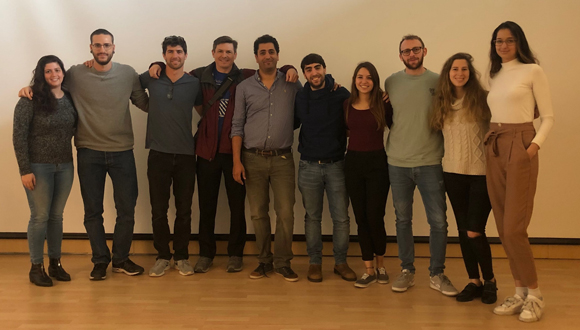
MIT expert helps promote synthetic biology at TAU
Prof. Christopher Voigt of MIT visits TAU to talk to researchers and set up new collaborations for grad students
Living organisms are amazing feats of engineering: By following instructions encoded entirely in DNA, living systems can sense and respond to their environment, build intricate structures and materials, and churn out complex chemicals. How these abilities are encoded is undeniably complicated, but figuring out how to embrace this complexity is at the heart of synthetic-biology.
Dr. Johann Elbaz, an Assistant Professor at Tel Aviv University’s Department of Molecular Microbiology and Biotechnology, organized the first professional visit to Israel of Prof. Christopher Voigt, MIT biological engineer and co-director of MIT’s Synthetic Biology Center. Located in Cambridge, Massachusetts, the Voigt lab is taking on the enormous task of designing, fabricating, and testing large sequences of DNA—20,000 bases long and more-at never-before-seen scales. It’s created software that automates the design of DNA circuits for living cells. The aim is to help people who are not skilled biologists to quickly design working biological systems.

Chris Voigt (Forth person from left) and Johann Elbaz (Fifth person from left) with the iGEM team at TAU at Tel Aviv University
Prof. Voigt gave an impressive talk at Tel Aviv University as a special seminar at the School of Molecular Cell Biology and Biotechnology, attended by researchers and students from different parts of the TAU campus as well as other universities. Prof. Voigt was a special guest of Dr. Elbaz, who came to help accelerate the development of synthetic biology in Israel, both academic and industrial.
During the visit, a collaboration was initiated between the Elbaz lab, a synthetic biology lab that specializes in applications within living nanomaterials and living sensors, and the center at MIT. This collaboration envisions the acceleration of graduate student exchange between MIT and at TAU, while further developing the field of synthetic biology in Israel.
The “equipped kitchen” approach to biology
“The grand vision of the Synthetic Biology is to tie everything together: the design, the building, and the testing,” Elbaz says. “Rather than refining a recipe over many years by preparing one dish at a time, a better approach is to equip a kitchen capable of making thousands of different recipes simultaneously, each with slightly different ingredients, cooking times, or other alterations. This allows for the study of the entire set together, to find common aspects between the best and worst results as a means of arriving at the perfect recipe. Such capability will accelerate the development of unique applications such as molecules and materials, extending what we can do through pure chemistry to smart agriculture and medicine that sense their environments and proceed accordingly to repair damage.”
All of these sound like far reaching applications. Could we really use synthetic biology to engineer living organisms? “Ultimately, we want to be able to design living systems at a complexity and a level of sophistication that we know is possible but we just don’t have the capability to do yet,” Elbaz concludes.
Featured image: Johann Elbaz (left) and Chris Voigt (right) in Jerusalem
Related posts



